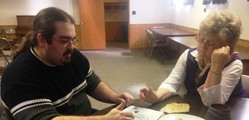First calls are filled with firsts.
“First-call pastors by definition are encountering firsts all the time,” says the Rev. Gregory Goodwiller, executive presbyter and stated clerk of the Presbytery of St. Andrew, one of the four original presbytery partners in the inaugural year of the Presbyterian Mission Agency’s Small Church Residency Program. “The first time you have to preach after being up all night with a family, the first time you teach the book of Acts—all of those firsts are difficult the first time.”
But first calls are also filled with seconds, which can be equally as challenging.
“Last year, our worship committee met right before our first Lent together,” says the Rev. Joel Montgomery, pastor of First Presbyterian Church of Vandalia, Missouri, and a member of the Small Church Residency Program’s class of 2013. “As a new pastor, I was just trying to figure out what is the culture of our congregation, what have we celebrated during Lent and Holy Week, what have we not celebrated, what are the traditions of the church. I was having the conversation every new pastor should have.”
Now, as his second Easter approaches, Montgomery says that the congregation is undertaking the exciting—yet often difficult—work of long-range planning, visioning together where the church is being called in Vandalia.
“We’ve had a chance to get to know each other a little more over the last two years,” he says.
Launched in 2009 and originally named For Such a Time as This, the Small Church Residency Program focuses on spiritual, vocational, and congregational transformation by pairing small, underserved congregations in rural, small-town, and urban settings with recent seminary graduates.
Integral to Montgomery’s call is encouraging the church to think missionally and to renew its worship and congregational life.
“When I again engaged the worship committee about exploring new possibilities for Lent and Holy Week for our second year, I asked them whether we had ever done something like a Passover meal for Maundy Thursday,” says Montgomery. “Although I know of many different services you can do for Maundy Thursday—last year we did footwashing with the United Methodist Church in our community—in our congregation there were some who knew only vaguely what a Passover meal was but very few who had ever participated in one.”
One of the things that Montgomery says he has come to appreciate is the wide variety and diversity in worship that Presbyterians are able to access.
“I’m really excited and very blessed to be in this congregation and this community as a pastor, because I do have a congregation that is at least patient with me if not as adventurous as I am,” he says.
Soon after Montgomery’s arrival, the church adopted the new Presbyterian hymnal, Glory to God, from which the congregation learns and sings a new hymn every Sunday. “There’s a lot about the new hymnal that we like as we move toward developing a more blended worship service incorporating contemporary elements,” he says. “A lot of our members were also glad to see the return of some of the ‘new’ old hymns.”
Now as the congregation prepares to celebrate Holy Week and Easter, Montgomery hopes to attract new people from the community to experience the Presbyterian Church at worship.
“Since I began my ministry, I have been intentional about working with our congregation to experience and appreciate that the Presbyterian Church is connectional and multicultural,” he says. “In exploring the many different practices in which Presbyterians can participate, it gets us to step outside of our own comfort zones to look at worship—and ourselves—in a different way.”

